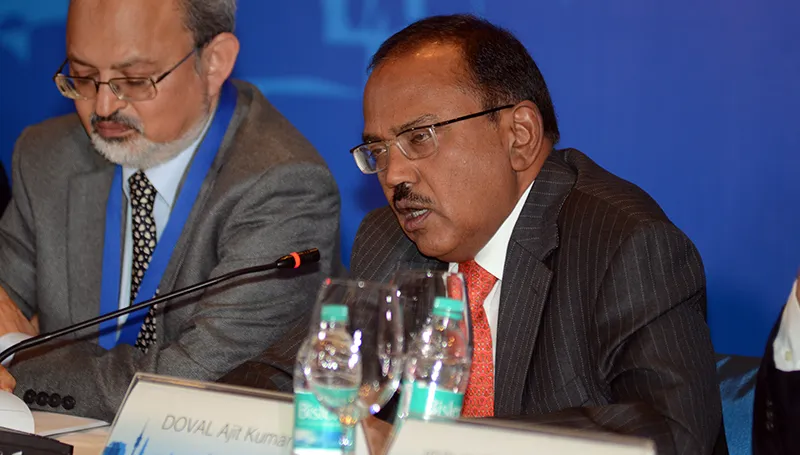Speaking at the Munich Security Conference in Delhi, NSA A.K. Doval said there is a need for collective response by countries to tackle terrorism as it will be very difficult for countries individually to fight terror effectively. He called for a Comprehensive United Nations Convention against Terrorism.

Pointing out that terrorism has become much more intense and threatening today than a decade ago, India’s National Security Advisor Ajit Kumar Doval on Tuesday called for a Comprehensive United Nations Convention against Terrorism to effectively deal with the menace disturbing global peace and stability.
The NSA was delivering the keynote address at the two-day 6th Munich Security Conference Core Group meeting organised in partnership with Observer Research Foundation in New Delhi on October 21.
The NSA said the problem of terrorism has become much more intense and disastrous than what was 13 years ago when the campaign against terror was launched.
The NSA said there is a need for collective response by countries to tackle terrorism as it will be very difficult for countries individually to fight terror effectively. "Unfortunately should something happen, there should be a collective response, a systemic convergence," he said. He noted that though many countries have made military, technical and legal systems to fight terror at the domestic level, at the global level we have failed to make much headway in creating global systems to fight terrorism.
The NSA pointed out that India had proposed a UN Convention against Terror way back in 2001, but still it is to be achieved as one country, Pakistan, opposed bringing the so-called "freedom-fighters" in the definition of terrorism.
The NSA said India wanted to resolve conflict with any country through talks and negotiations. "We believe that there is no conflict which cannot be resolved through talks in a peaceful way," he said.
Commenting on the changing nature of conflicts powered by economics and regional interests, the NSA said that the threat of terrorism constituted only 40 percent of the danger and what is important is the response. "There is need for convergence, automated systems and institutionalised mechanism and meaningful partnership" to combat the threat of terrorism, he said.
He said the New Delhi government believes that democracy can be a great unifying force in the region as well as the world by helping maintain peace and stability. With this in mind, Indian Prime Minister Narendra Modi had invited all head of governments in the region to the swearing in, the NSA noted.
Saying India is greatly concerned over the situation in the West Asia, the NSA underlined the need for keeping democracy afloat in Afghanistan and preventing external pressures on the country. He complimented the US for its efforts to bring about agreements among the Presidential contestants.
During the question-answer session, the NSA ruled out any territorial compromise in the on-going bilateral dialogue with China to resolve the pending border dispute.
"Our territorial integrity cannot be compromised but I find positive signals from China and we have to evolve and engage each other rather than work in isolation."
Munich Security Conference Chairman Wolfgang Ischinger said with a new government in place in Delhi, there were "lots of expectations, aspirations and also curiosity" on the government’s new security and foreign policy.
Saying he favoured India to be made a permanent member of the UN Security Council, Ischinger said the conference meeting may discuss ways to encourage UN reforms. In his opening remarks, ORF Director Sunjoy Joshi pointed out that India’s extended neighbourhood, the Middle East, goes through great turmoil and new threats, new actors and new developments emerge daily at a pace that drives even the most seasoned security expert dizzy.
He said Delhi is not just the epicentre of major economic changes but a central part of a region that is undergoing significant changes. What does the future bode for the region? To what extent will regional players step into fill the void? Joshi said the conference will discuss all these issues.
Around 70 senior decision-makers from politics, business, media and civil society from India, as well as the Euro-Atlantic, Asian and the Middle East region took part in the meeting to discuss key issues of international security policy.
The participants included José Antonio Meade Kuribreña, Foreign Minister of Mexico, Umer Dauzdai, Minister of the Interior of Afghanistan, Joseph M. Cohen, National Security Advisor of Israel, Markus Ederer, Deputy Foreign Minister of Germany, Kevin Rudd, former Prime Minister of Australia, Shashi Tharoor, Chairman of the Indian Parliamentary Standing Committee on External Affairs, Norbert Röttgen, Chairman of the German Bundestag’s Foreign Affairs Committee, Hans-Peter Bartels, Chairman of the German Bundestag’s Defence Committee, Cem Özdemir, Federal Chairman, Alliance 90/The Greens and Member of the German Bundestag, Anvar Azimov, Ambassador-at-Large of the Russian Foreign Ministry, John McLaughlin, former Acting Director of the Central Intelligence Agency, Bob Blackwill, former U.S. Ambassador to India and former U.S. Deputy National Security Advisor, Jane Harman, Director and CEO of the Woodrow Wilson International Center for Scholars.
Besides Doval and Shashi Tharoor, other participants from India were Sujatha Singh, Foreign Secretary of the Ministry of External Affairs, Arvind Gupta, Deputy National Security Advisor, Lalit Mansingh, Former Foreign Secretary of the Ministry of External Affairs, Navtej Sarna, Secretary (West) of the Ministry of External Affairs and Ananth Guruswamy, Director of Amnesty International India.
The views expressed above belong to the author(s). ORF research and analyses now available on Telegram! Click here to access our curated content — blogs, longforms and interviews.




 PREV
PREV

